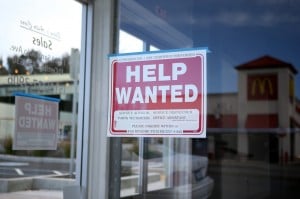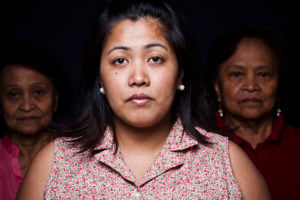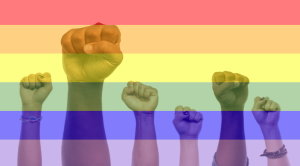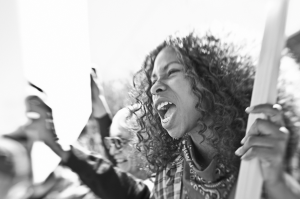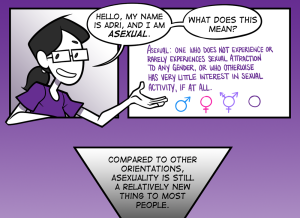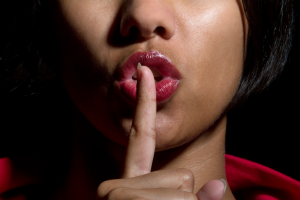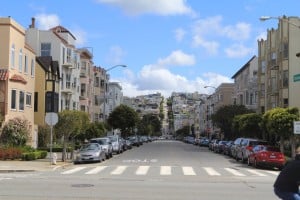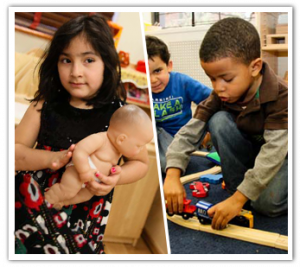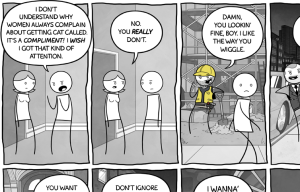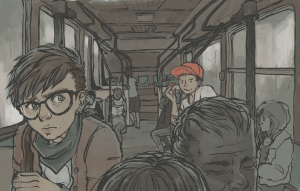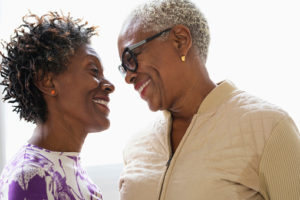
Smiling people looking into each other’s eyes
As I get older, making new friends within the LGBTQ+ community becomes more difficult. My 30-year-old self rarely seeks out kindred spirits on the dance floor because my body just won’t allow for it.
In addition, queer-friendly spaces that aren’t nightclubs are rapidly shutting down due to gentrification.
This bothers me because building accountable and authentic relationships within the queer and trans community is something I cherish. Being in community feeds me and reminds me that my identities are valid and valuable.
Community is what has enabled LGBTQ+ people to endure centuries of systemic oppression. I would feel lost without queer and trans chosen family in my corner rooting for me and catching me when I fall.
I recognize that being able to access my community is only going to get harder with age and that it’s a privilege often not afforded to LGBTQ+ elders.
Instead of celebrating older queer and trans folks, we render them invisible — even though they paved the way for us.
For instance, Naomi Finkelstein, a 54-year-old mixed-race, pansexual, non-binary writer and certified peer specialist living in Seattle, has been told they aren’t queer or trans enough by younger LGBTQ+ people.
“I’m an OG originally from the South Bronx, but because I’m older, and I don’t have tattoos all over my body, they think I’m not queer enough,” says Finkelstein.
This type of ageism from should-be allies and accomplices only makes Finkelstein feel more isolated in a society that neglects the needs of both LGBTQ+ and older people.
While Finkelstein has been able to tap into some community supports, such as friendly neighbors in their low-income apartment building and a local program that delivers them nutritious meals, their ability to live a full life was recently threatened by Trumpcare, the Republicans’ attempt to take health insurance away from roughly 22 million Americans.
Finkelstein was just one of 15 million Americans who were at risk of losing their Medicaid, a publicly funded health insurance program that was expanded by former Pres. Obama’s Affordable Care Act (ACA), also known as Obamacare.
Between 2014-2017, the ACA insured 11 million new Americans via Medicaid and insurance plans offered on state health care exchanges, including significant numbers of LGBTQ+ people.
According to Laura Durso, vice-president of LGBT Research & Communications at the Center for American Progress (CAP), the ACA has helped the uninsured rate for LGBTQ+ Americans go down 35 percent.
These gains would be lost if Republicans’ efforts were successful, and the CAP estimates that half a million LGBTQ+ Americans will lose Medicaid if Trumpcare goes into effect.
Fortunately, the GOP’s push to end Obamacare has been unsuccessful thus far.
On July 17, 2017, Republican Senate Majority Leader Mitch McConnell announced that the Senate’s bill to repeal and replace Obamacare, entitled the Better Care Reconciliation Act (BCRA), didn’t have the 50 votes it needed to become law because Republican senators Mike Lee of Utah and Jerry Moran of Kansas did not support the bill.
Lee and Moran joined two other Republican senators in opposing the BCRA, which would roll back Obama’s Medicaid expansion by providing tax cuts to the wealthy to the tune of $772 billion.
While this is a temporary victory, the fight for affordable health care for all is far from over. McConnell has already said he wants to pass a measure to repeal the ACA over a period of time and work on a replacement bill over the next two years.
Because Finkelstein is a disabled wheelchair-user living with chronic illnesses, it hasn’t been easy for them to engage in resistance against Republicans’ healthcare attacks.
Younger queer and trans folks often take for granted our ability to fight for our rights in the streets when, one day, we’ll be dealing with the same health issues as Finkelstein, who’s genuinely afraid of dying if they lose their health insurance.
As someone who respects the sacrifices made by LGBTQ+ elders for me to have civil rights protections as a younger Black queer non-binary person, I realize that I can’t sit idly as their hard-won rights are stripped away.
One of the first steps we can all take is learning more about how this community is impacted when they don’t have access to meaningful health care.
If you aren’t convinced about fighting for our elders, below are five reasons you should care about LGBTQ+ elders having access to health care:
1. They need low-cost or free health insurance to afford expensive medications, medical equipment, and long-term care.
One-third of LGBTQ+ adults age 65 and over live at or below 200 percent of the federal poverty level, which is an income of $24,120 a year for a household of one, according to Durso.
Medicaid makes it possible for low-income LGBTQ+ elders to afford the robust medical care they need.
In order to be fully mobile, Finkelstein needs an electric scooter, which costs approximately $3,000 and has to replaced every two years.
There’s no way they could afford this without Medicaid and anticipating cuts to the program, Finkelstein and their friends who are also wheelchair-users have been searching for bike collectives to help weld broken manual chairs.
In addition to requiring expensive medical equipment that would be impossible for them to obtain without insurance, Finkelstein relies on Medicaid to pay for home health care services that allow them to live independently.
Medicaid pays for 40 percent of long-term care services and support and for 60 percent of all nursing home patients, according to the Center on Budget and Policy Priorities.
Trumpcare would remove LGBTQ elders’ ability to stay independent and connected to their communities, which are essential to their well-being.
2. Historically, LGBTQ+ seniors have been discriminated against by health insurance companies.
According to Aaron Tax, Director of Federal Government Relations at Services & Advocacy for GLBT Elders (SAGE), the ACA not only made healthcare more affordable, but it also increased access for marginalized populations across the board, including LGBTQ+ older adults.
One way it did this is by banning discrimination in health care based on sex (which has been interpreted by courts to also include gender identity) and other categories in a piece of the legislation called Section 1557, meaning insurers can no longer legally exclude LGBTQ+ people.
This made it possible for older trans adults who were historically kept out of the health insurance market to become insured for the first time.
Before the ACA was passed, Durso says that being transgender was considered a pre-existing condition.
If the BCRA passed, it would be legal to discriminate against those with pre-existing conditions by charging them exorbitant rates or keeping them out of the health insurance market altogether, which would disproportionately impact LGBTQ+ elders.
Also under the BCRA, older adults would be forced to pay thousands more than younger adults if buying an insurance plan from their state health care exchange.
3. They live with chronic illnesses that require lifetime care.
Older LGBTQ+ adults face a tremendous number of health disparities as compared to their heterosexual and cisgender counterparts, says Tax.
They have chronic conditions such as HIV/AIDS, diabetes, and high blood pressure that require care across their lifespan.
Trumpcare would allow health insurance companies to put a limit on a person’s total lifetime benefits, meaning that once a lifetime limit is reached, an insurance plan would no longer pay for covered services.
Lifetime limits on health insurance are unfair to older adults who would be left high and dry if their coverage ran out.
4. They need access to health care in their own neighborhoods.
Because of mobility issues and lack of access to a car or public transit, having health care in their neighborhood is important for LGBTQ+ elders.
“LGBTQ+ older adults are more socially isolated. They may not have the support systems in place to drive to get care,” says Durso. “If you’re an LGBTQ+ older adult in a rural town, geographically isolated and can’t get care close to your home, where do you go?”
One option for them is community health centers, which are designed to support folks where they are and have benefitted from new investments made by Obamacare.
Queer and trans elders living in cities may have access to clinics specifically for LGBTQ+ patients, such as Whitman Walker Health in D.C. and Fenway Health in Boston.
With over 600 clinics across the country, Planned Parenthood (PP) also provides queer and trans elders with neighborhood health care, including lifesaving transition-related care.
Republicans have targeted PP for a long time, mostly because of their abortion services, completely disregarding that PP provides many historically oppressed groups with culturally competent primary care.
Caring about LGBTQ+ elders means protecting PP at all costs.
5. They need our support while they’re still living.
Far too often, we don’t tell our queer and trans elders how much they mean to us until they’re gone. They need to hear from us now.
I’m challenging myself and others to reach out to LGBTQ+ elders in our lives and offer them friendship and support.
We have so much to learn from them about our glorious past that will be lost once they’re gone and their stories can guide us as we navigate our complex futures.
Queer and trans younger adults building community with our older peers is especially important since our current LGBTQ+ movement marginalizes members of our community who are living at the intersection of multiple oppressions.
I dream of an LGBTQ+ movement that is intersectional as hell, but this will never happen if we continue ignoring the needs of older queer and trans folks.
Elders like Finkelstein dared to be queer and trans during a time when it was essentially illegal, so now is the time to pay them back for their bravery.
[do_widget id=’text-101′]
Neesha Powell-Twagirumukiza (she & they pronouns) is an Everyday Feminism Reporting Fellow. Neesha identifies as an intersectional feminist, womanist, writer, community organizer, facilitator, dancer, freedom fighter, wife, and cat mama. She’s constantly conspiring in the name of liberated Black futures, queer and trans people of color power, solidarity economics, and transformative justice/community accountability. Neesha’s based in a suburb south of Seattle, where she lives, loves, and creates with chosen family.
Search our 3000+ articles!
Read our articles about:
Our online racial justice training
Used by hundreds of universities, non-profits, and businesses.
Click to learn more






